
Steel Caucus urges Vietnam retain 'non-market economy' status
The Congressional Steel Caucus have expressed concern regarding the US government’s potential trade status change for Vietnam.

The Congressional Steel Caucus have expressed concern regarding the US government’s potential trade status change for Vietnam.

U.S. Steel and Nippon Steel explained their position on USS’ participation in US trade cases should their proposed nearly $15-billion merger deal go through. The companies hope to close the deal by the end of the year.

The Canadian Steel Producers Association (CSPA) has lauded Canada’s decision to launch an investigation into China’s unfair trade practices in electric vehicles (EVs). However, the association hopes the government will go even further and extend the investigation into other sectors.

A press conference at a Cleveland-Cliffs mill in Ohio touched upon several topics, including the unfair trade practices of Mexico and China and Nippon Steel’s proposed acquisition of U.S. Steel.

We have heard ominous warnings about a flood of Mexican steel threatening the US market. It's the kind of rhetoric that gets thrown around often with little regard for the facts. The reality is that the Mexican steel surge is simply not happening, and the US steel industry has consistently maintained a significant trade surplus in finished products with Mexico. In 2023 alone, this surplus exceeded $3 billion.

The chairman of a large American steel company called for Mexico to be dropped from USMCA at a steel industry conference last week. This follows earlier calls from members of Congress to reinstate Section 232 duties on Mexico. How did we get to this point?

Former President Trump’s visit to Capitol Hill last week made a lot of news. One proposal directly involves international trade and tariffs. While the specifics are hazy, President Trump allegedly talked about replacing the federal income tax on individuals with tariff increases. Let’s check that out.

The USMCA is an important trade agreement, as long as the member countries honor its requirements. These were the sentiments echoed by top officials of the Steel Manufacturers Association (SMA) and Metals Service Center Institute (MSCI) during a press conference at their annual meeting last week in Scottsdale, Ariz.

President Joe Biden announced that the US will extend the suspension of Section 232 tariffs on steel products imported from Ukraine for another year. The Biden administration first lifted the 25% Section 232 tariffs on steel imports from Ukraine after the breakout of war with Russia in 2022. The initial waiver was good for one […]

The US OCTG Manufacturers Association (USOMA) announced that the US Customs and Border Protection (CBP) agency made an initial affirmative determination of duty evasion practices.

In conjunction with President Biden’s visit to Vietnam in September 2023, Vietnam’s government petitioned the US Department of Commerce (DOC) for “market economy” treatment. This would be a major trade concession, as DOC has recognized for years that Vietnam’s economy does not operate according to market principles. However, graduating Vietnam to market economy status would […]

The free market operates best when it is freest. But all governments intervene in markets in response to conditions that threaten peaceful progress. President Biden decided last week that market intervention was justified. He approved a report from the US Trade Representative (USTR) that recommended continuing the “Section 301” tariffs on Chinese imports into the United States.

The USMCA should be strong enough to handle trade disagreements on steel between the US and Mexico, according to the American Iron and Steel Institute’s (AISI’s) Kevin Dempsey.
Non-refillable steel cylinder imports from India are subject to new antidumping and countervailing duties (AD/CVD).

Following the announcement earlier this week that the US will hike import tariffs on Chinese goods, including steel and aluminum, Canada’s steel industry called on its government to consider similar tariffs.

The Canada Border Services Agency (CBSA) has completed its portion of an expiry review of the antidumping duty orders on welded standard pipe from Pakistan, the Philippines, Turkey, and Vietnam.

The Biden administration announced a series of actions on Tuesday targeting China’s "unfair" trade policies. These actions will, among other things, make imports of steel and aluminum from the Asian nation even more prohibitive.

The Inflation Reduction Act (IRA) appropriated more than $4 billion to the General Services Administration (GSA) and Federal Highways Administration (FHWA) for “Buy Clean” programs. The statute makes clear that GSA and FHWA purchases under these programs are limited to those with “substantially lower” emissions. There is no ambiguity in that requirement. The Environmental Protection Agency (EPA) has defined “substantially lower” to mean products with the lowest 20% of embodied emissions when compared to similar materials.

A vote on Friday by the International Trade Commission (ITC) ensures that antidumping duties on certain steel sheet imports from Japan will continue for the mid-term.

Tariffs on unfairly traded steel and other products help to stabilize America’s most important industries, safeguard tens of thousands of jobs, and protect national security. My union, the United Steelworkers (USW), never seeks these remedies lightly. And presidents, Republican and Democrat alike, implement them only after diligent investigations documenting the harm that foreign adversaries intentionally inflict upon our country with dumping, overproduction and other kinds of trade cheating. I don’t think Lewis Leibowitz considered these points while criticizing tariffs in his excessively pro-free-trade column, “Where is the voice of the consumer?” on May 5.

The election campaign is white-hot right now, and the Biden administration is touting its protectionist message. Just this past week, the Office of the US Trade Representative (USTR) touted this message. In a release entitled “What They are Saying,” USTR quoted many of the usual protectionist groups praising government action against Chinese steel exports and shipbuilding. Consuming industries in the United States, which employ many times the American workers as the industries seeking trade protection, were not mentioned.

Steelmaking currently accounts for approximately 8% of global greenhouse gas emissions. The only way to achieve net zero goals is to significantly reduce steel emissions worldwide. And there is no way to do that without recycling.

The Biden administration on Wednesday announced measures to support the domestic steel industry.

The Department of Commerce (DOC) has issued new rules to combat evolving "unfair" trade practice — including the unfair trade of steel products. They go into effect on Wednesday, April 24.

To ease trade tensions with the United States, the economy ministry in Mexico is preparing measures to strengthen definitions on steel being shipped into the country. Mexico has faced accusations it is being used as a route for steel and aluminum produced in Asia to be sent on to the US, so-called triangulation.

President Biden said on Wednesday he would stand by his commitment to US workers regarding the proposed sale of U.S. Steel to Japan’s Nippon Steel.

Japanese Prime Minister Fumio Kishida will be in Washington this week where one topic under discussion with President Biden will be U.S. Steel's proposed sale to Nippon Steel.

The Biden Commerce Department just issued a broad rewrite of regulations dealing with a host of antidumping and countervailing duty issues. This week, I write about one of those issues, where it looks like Commerce made a wrong turn.

The US Department of Commerce’s International Trade Administration (ITA) has revised upwards the antidumping duty (AD) rates on imports of cold-rolled steel flat products from two South Korean producers.

I can’t really define “Bidenomics” because it is so filled with contradictions. It seems to aim to increase manufacturing output in the United States. But not all increases are created equal.